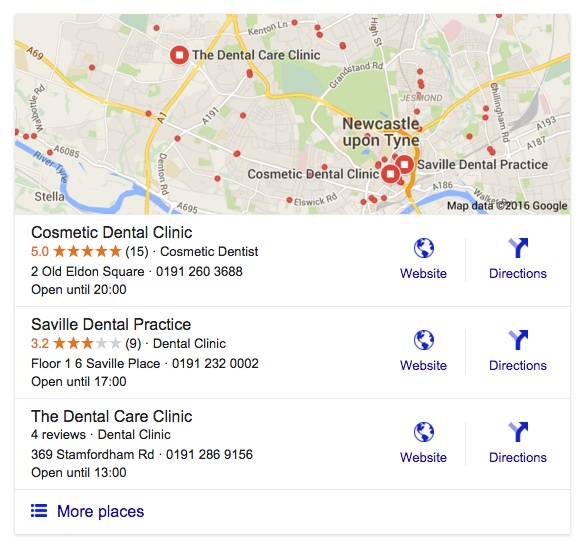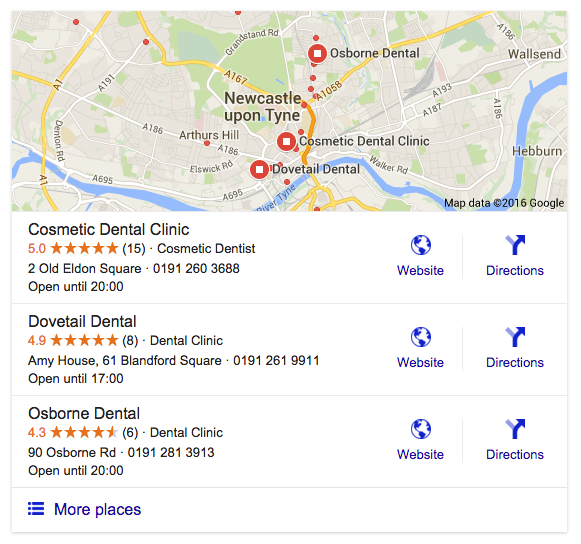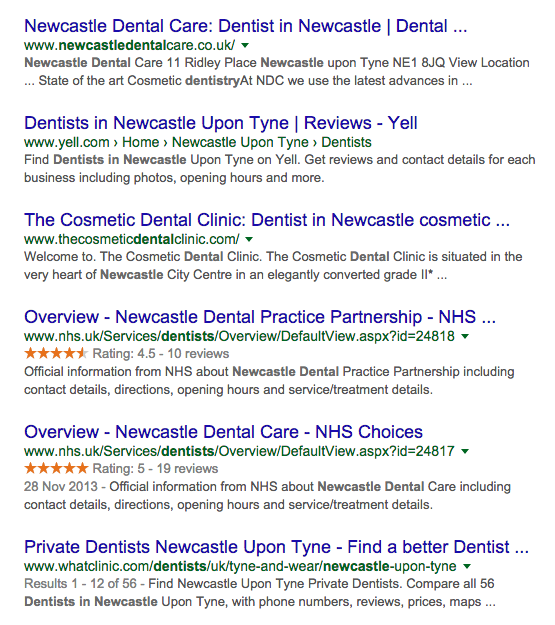In the world of SEO, the smallest targets often attract the toughest competition. While putting together our Complete Guide to Local SEO in 2016, we discovered that many local keywords had tougher competition than large national and international keywords.
Talk about local rivalries. Across the UK and around the world, local dentists, doctors, cleaning services, solicitors and other small businesses are competing against each other to rank first in Google’s local listings, often extremely fiercely.
If you’re managing SEO for a local business, how can you identify your competitors’ weak points and make your website a better match for local search terms than theirs? How can you dig deep into their listings, citations and links to make sure yours are better?
As surprising as it might sound, local SEO competitor analysis isn’t that difficult. Below, we’ve put together a four-step process to help you discover how and why your local competitors are ranking for your target keywords.
Step #1: Identify your local competitors
Before you can start researching your competitors, you need to find them. Start the process by searching for a few keywords your own prospective customers would use to find your business using Google.
Let’s pretend we’re launching a local SEO campaign for a brand new dental clinic located in the city of Newcastle. Before we begin any optimisation process, we need to identify the businesses we’ll be competing with in Google’s search results.
In our example below, we’ve searched for the following keywords, both of which should bring up similar results:
- “dentist in Newcastle”
- “Newcastle cosmetic dentist”
Here are the local search results for “dentist in Newcastle”:
Here are the local search results for “Newcastle cosmetic dentist”:
Sure enough, both listings bring up an obvious local SEO competitor: a local dental clinic called Cosmetic Dental Clinic that’s dominating the three pack for both keywords. Since this business is the strongest local result, it’s the best place to begin our analysis.
Step #2: Find listings and citation opportunities
Since citations and reviews play such an important role in local SEO, our first step should be to find our competitors’ reviews, listings and citations. There are several ways to do this, some of which are manual and others which involve paid software:
- Google the competitor’s brand name and track down directories, review websites and other resources that list their name, address and phone number.
- Use a tool like Moz Local to spy on their citations and discover what percentage are complete, incomplete, inconsistent or duplicated.
- Enter their information into Synup to scan hundreds of directories and review websites and locate their reviews, listings and citations.
Once you’ve found their citations, note them in a Google Docs or Excel spreadsheet. When you begin optimising your own website for local search, you’ll want to start by building citations on all of the same websites your main competitors appear on, as well as their missed opportunities.
Step #3: Examine their backlink profiles
There are two different aspects to local SEO. The first is optimising for Google’s three pack map listing, which requires citations and reviews. The second is optimising for the organic results that appear below Google’s map pack section for each keyword.
For our “dentist in Newcastle” keyword, the organic results present an additional opportunity to generate traffic from local search queries.
A quick look at the organic search results shows a different dental clinic ranking first, then Yell, a local directory website. The Cosmetic Dental Clinic, the first result in Google’s local pack, is third in the organic listings. Fourth, fifth and sixth are NSH subpages and another directory website.
It’s clear that our local competitors have fairly strong backlinks, since they’re outranking results from NSH.uk and other authority websites. To work out how they’re ranking for these keywords, we can dig into their backlinks using tools like Majestic and Ahrefs.
Backlink analysis using Majestic or Ahrefs shows us most (but not all) of the other websites that are linking to our local SEO competitors. A quick analysis of most of the local business websites in the organic results shows links from organisations like North East Private Dentists.
Since we’re also marketing a dental clinic, a link like this is easy to replicate and would be at the top of our “to build” list. Most local backlink profiles are made up of a mix of local directory links, testimonials from other local businesses, professional organisations and local news websites.
Since you won’t be able to replicate every link a competitor has, there’s no need to take note of all their links. However, you’ll want to take note of quick and easy link building opportunities like local directories, business review websites and industry organisations.
Step #4: Analyse their on-page content
As a new business in a competitive industry, it’s tough to compete with entrenched competitors in the beginning. After all, they have more links, citations, reviews and other ranking signals than you, and catching up can take a significant amount of time.
However, there’s one way you can compete and very often win: through great on-page content that puts your website ahead of theirs. Our list of seven simple on-page improvements is a great place to start optimising our on-page SEO to put your website ahead of your local competitors.
After you’ve analysed your main competitor’s backlinks, review their on-page content. Check if the primary target keyword is used in the page title, in H1 and H2 tags and in the content. View images to see if they’re optimised with the correct titles, filenames and alt text.
Better yet, check how long their top-ranking pages are. Data shows that long pages are usually the most likely to rank well in Google’s search results. By creating content that’s more detailed, engaging and helpful than your competitors, you can speed up the process of outranking them.
It’s rare that you’ll outrank your local competitors in the organic listings with on-page SEO alone, but improving your website with content that’s better than the industry average is a great way to put yourself at an advantage when it comes time to start building links and local citations.
How tough is your local SEO competition?
Local organic search can be a lucrative source of inbound leads for your business, but getting to the top of the local rankings is rarely easy. Our local SEO services help your business increase its visibility in local search to generate more traffic, phone calls and sales.




 (
( (
(
 Like us on Facebook
Like us on Facebook
 Follow us on Twitter
Follow us on Twitter
 Connect on LinkedIn
Connect on LinkedIn